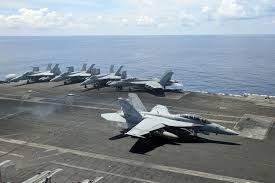Pompeo Urges Southeast Asia to Cut Ties With ‘Bully’ China Firms
Thursday, September 10, 2020
Categories: ASCF News Emerging Threats National Preparedness

Source and Photo: https://www.bloomberg.com/news/articles/2020-09-10/vietnam-backs-u-s-role-in-south-china-sea-rebuffing-beijing
U.S. Secretary of State Michael Pompeo called on Southeast Asian countries to review ties with Chinese state-owned enterprises, stepping up pressure on Beijing over territorial disputes in the South China Sea.
“Don’t just speak up, but act,” Pompeo said during a virtual summit with foreign ministers of the Association of Southeast Asian Nations on Thursday. “Reconsider business dealings with the very state-owned companies that bully Asean coastal states in the South China Sea. Don’t let the Chinese Communist Party walk over us and our people.”
Tensions in the South China Sea have risen in the past few months as the U.S. and China spar on everything from democracy in Hong Kong to data security over popular Chinese apps TikTok and WeChat. In July, the U.S. explicitly rejected China’s expansive maritime claims in the region for the first time, and sent aircraft carriers to the waters to conduct military exercises.
China last month fired missiles into the South China Sea, a move that underscored the growing cost of any armed conflict in the region. The missiles showed China’s ability to strike out at U.S. bases and aircraft carriers, the major sources of American power projection in the region.
Pompeo’s remarks come after the U.S. last month announced trade and visa restrictions on 24 companies for their efforts to help China “reclaim and militarize disputed outposts” in the contested maritime area -- the most prominent being the state-owned China Communications Construction Co., a critical builder of “Belt and Road” initiative projects.
During the meeting, Pompeo raised concerns over the China’s actions in the South China Sea, reiterating that the U.S. regarded Beijing’s expansive maritime claims in the waters as unlawful according to a 2016 international tribunal ruling. China regards the decision as illegitimate because it opted out of dispute settlement provisions when it signed up for United Nations Convention on the Law of the Sea.
“I know many of you were skeptical about the Trump administration and our intentions when we took office,” he said. “You should have confidence that America will be here in friendship to help you, just as we’ve been for the last three and a half years.”
Vietnam’s top diplomat said Southeast Asian countries want the U.S. to play a role in maintaining peace in the South China Sea, pushing back against Beijing’s comments that American forces were destablizing the region. Vietnam holds the bloc’s rotating chairmanship.
“We welcome the U.S.’s constructive and responsive contributions to Asean’s efforts to maintaining the peace, stability and developments in the South China Sea,” Vietnam Foreign Minister Pham Binh Minh said during the summit. Without naming China, he said the militarization of the sea “eroded trust and confidence, increased tensions and undermined peace, security and rule of law in the region.”
Southeast Asian countries were open to opportunities for practical cooperation with the U.S. in the region, Minh said. Vietnam, the Philippines, Brunei and Malaysia have been locked in territorial disputes with China that have impacted their ability to extract fish, oil and gas from offshore areas.
‘Military Pressure’
At a virtual summit a day earlier, Chinese Foreign Minister Wang Yi told Southeast Asian foreign ministers the U.S. was intervening in territorial disputes and strengthening its military deployment in the contested area “out of its own political purposes.” He called the U.S. “the biggest driver of militarization of the South China Sea,” according to statements posted by China’s Foreign Ministry.
The U.S. has become “the most dangerous factor that damages the peace in the South China Sea,” Wang said, reiterating China’s position that disputes should be solved by regional countries. “Peace and stability are China’s greatest strategic interest in the South China Sea, which are also the common aspiration of Asean countries,” he said.
On Wednesday, Wang rejected the idea that China claims all waters within the nine-dash line as its territorial sea, calling it a “distortion” of China’s stance. He insisted China’s claim of islands in the South China Sea has “abundant historic and legal basis.”
He also argued that Chinese construction on reefs and islets was meant to improve living conditions and provide “public good” for the region. “In the face of a non-regional country’s military pressure, of course we have the right to protect our own sovereignty,” he said.




